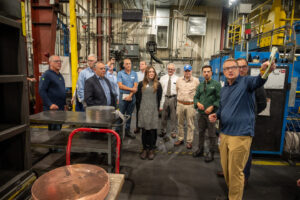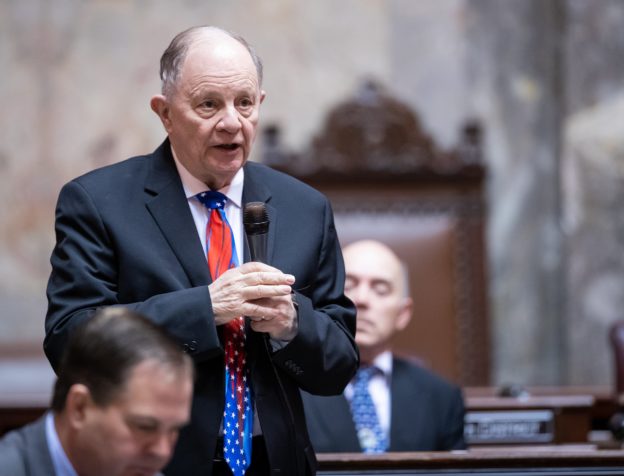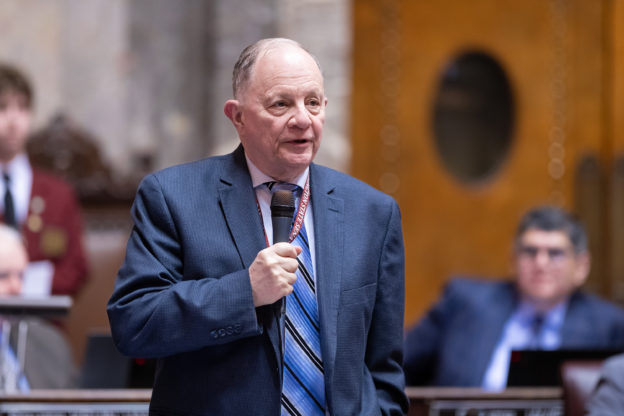Note: The following e-newsletter was sent to Sen. Padden’s subscribers October 12, 2023. To subscribe to Sen. Padden’s newsletter, click here.
Dear friends and neighbors,
The public is invited to an upcoming “Taxpayer Town Hall” hosted by Spokane County Treasurer Michael Baumgartner and myself. It takes place this coming Tuesday, October 17, from 6 to 7 p.m. at the CenterPlace Regional Event Center in Spokane Valley.
Topics to be covered include issues affecting 2024 property taxes and policy proposals surrounding the exemptions for seniors and people with disabilities. There will be opportunities to ask questions.
We hope to see you and others there!
If you have questions about how to participate in state government this year or thoughts to share on anything in this e-newsletter, please give me a call or send me an email.
Thank you, as always, for the honor of serving as your state senator!
Best Regards,
Senator Mike Padden
Senate Law and Justice Committee meets in Spokane
It was good to welcome Senate Law and Justice Committee colleagues to Spokane, including four fellow Republicans. In the foreground is 15th District Senator Nikki Torres, R-Pasco. In the background (from left to right) are 39th District Senator Keith Wagoner, R-Sedro-Woolley; 17th District Senator Lynda Wilson, R-Vancouver; Senator Padden; and Senate Republican Caucus staff attorney Saundra Richartz.
While it doesn’t happen often, legislative committees occasionally hold meetings and work sessions in communities outside of Olympia. Doing so allows lawmakers on these panels to see other parts of the state and meet with constituents and stakeholders who are unable to travel to the Capitol.
That was the case when the Senate Law and Justice Committee met October 2 at Washington State University’s Riverpoint campus in Spokane. Go here to view the agenda. As its ranking Republican, I was glad to welcome the other committee members to Spokane. Go here to view a video of the meeting.
Wagstaff named manufacturing company of the year by Valley Chamber
As noted in the next story below, Wagstaff Inc. was one of the local manufacturing companies that the Association of Washington Business Manufacturing Week tour visited last week. The Spokane Valley Chamber of Commerce recently announced that it had awarded Wagstaff its 2023 Manufacturing Excellence Award For Manufacturer Of The Year. According to the chamber, the award recognizes a manufacturer committed to business excellence and has found creative solutions to challenges that enhance the industry.
AWB’s manufacturing tour stops in Spokane
Honeywell’s Lou Broughton shows others, including Senator Padden, part of the company’s facility. (Photo courtesy of Association of Washington Business.)
Manufacturing is an important part of Washington’s economy, one that should be a higher priority for some state and legislative leaders. Every year a key business organization based in Olympia does a very good job of highlighting the importance of manufacturing to our state.
The Association of Washington Business is wrapping up its annual Manufacturing Week tour across the state this week. The tour, which began October 4, stopped in Spokane last Thursday. I joined AWB officials and others at some manufacturing companies in the Spokane Valley area, including Honeywell and Wagstaff. (A few local companies were among the sponsors of the Unlock Your Future event at the HUB that attracted about 1,400 middle school students in the Spokane area. The Unlock Your Future student handbook can be viewed here.)
While the tour was in Spokane last week, AWB President Kris Johnson delivered a State of Manufacturing address. AWB’s report on Johnson’s address, which can be viewed here, shares several interesting statistics:
- Manufacturing employs nearly 270,000 Washington residents, which is 8% of the state’s workforce.
- There are more than 6,400 manufacturing companies, including 577 in Spokane County, which has more than 16,000 people in manufacturing careers.
- There are 24 counties in Washington with at least 1,000 manufacturing workers, and five counties with more than 10,000 workers.
Transportation Committee discusses traffic safety proposal
On Monday, I was in Olympia to attend the Senate Transportation Committee’s meeting. The committee agenda can be viewed here.
Part of the meeting focused on a proposal that I have championed in recent years – using roadside oral fluid testing to better determine if a driver is impaired by certain drugs, including cannabis, cocaine, amphetamines, methamphetamines, opioids and benzodiazepines.
During the committee’s discussion on this issue, traffic safety analyst Chuck DeWeese presented on roadside oral fluid testing in more detail. His presentation can be viewed here. Chris Kirby, an official with the Indiana Criminal Justice Institute, then told committee members about his state’s oral fluid program. A PowerPoint presentation on the Indiana program can be seen here.
A video of the two presentations on roadside oral fluid testing can be seen here.
Retail theft continues to plague Washington
Several types of crime have worsened here in Washington, due largely to a 2021 law that makes it harder for law-enforcement officers to pursue and arrest suspects, and in turn makes it easier for criminals to break laws without fear of being arrested. Another reason for the crime increase is the low number of law-enforcement officers in Washington compared to other states.
One crime that particularly hurts businesses, workers and consumers alike in Washington is retail theft, which also is a national crime problem.
Retail theft has gotten so bad that Target is closing two of its stores in our state’s largest city. Go here to read a recent Seattle Times story on how the closures of those stores in Seattle will affect 90 employees. Target has said the employees will be able to transfer to other locations.
The Times article pointed out that retailers nationwide are being forced to contend with shoplifting causing a loss of inventory, or “shrinkage.” According to a recent study by the National Retail Federation, shrinkage for total retail sales in 2022 reached $112.1 billion, up from $93.9 billion in losses in 2021.
The Washington Retail Association said theft costs businesses $2.7 billion a year statewide.
Washington’s Capitol Building in the fall.
This is not a new issue for our Legislature. A year ago the Senate Labor and Commerce Committee dedicated a work session to retail theft, and the state Attorney General’s Office presented data which can be seen here. The presentation noted how organized retail theft is a growing problem in many communities. Because of the increase in retail thefts, stores are forced to raise prices, which hurts consumers.
Things have become so bad for retailers that the Washington Retail Association, which represents grocers and retailers across the state, created a crisis planning guide for retailers specifically to address rising crime in the state. Basically, the state’s retail association had to help stores figure how to navigate retail theft since the state hadn’t provided enough help to solve this problem.
It is time for the Legislature to place more attention on this crime issue.
Newspaper story on opening of Liberty Lake’s Lud Kramer Bridge
Bicyclists ride across the Lud Kramer Bridge soon after it opened. (Photo courtesy of Washington State Department of Transportation.)
In case you missed it, the Spokane Valley Herald did a recent story on the official opening of the Lud Kramer Bridge. You can read the story here.
Contact us!
If you have a question or concern about state government, please do not hesitate to contact our office. During the interim we are conducting business from our district office in Spokane Valley. We are here to serve you!
Phone: (509) 921-2460
Email address: Mike.Padden@leg.wa.gov
PLEASE NOTE: Any email or documents you provide to this office may be subject to disclosure under RCW 42.56. If you would prefer to communicate by phone, please contact Sen. Padden’s Olympia office at (360) 786-7606.
To request public records from Sen. Padden, please contact Randi Stratton, the designated public records officer for the Secretary of the Senate and Senate members.



















